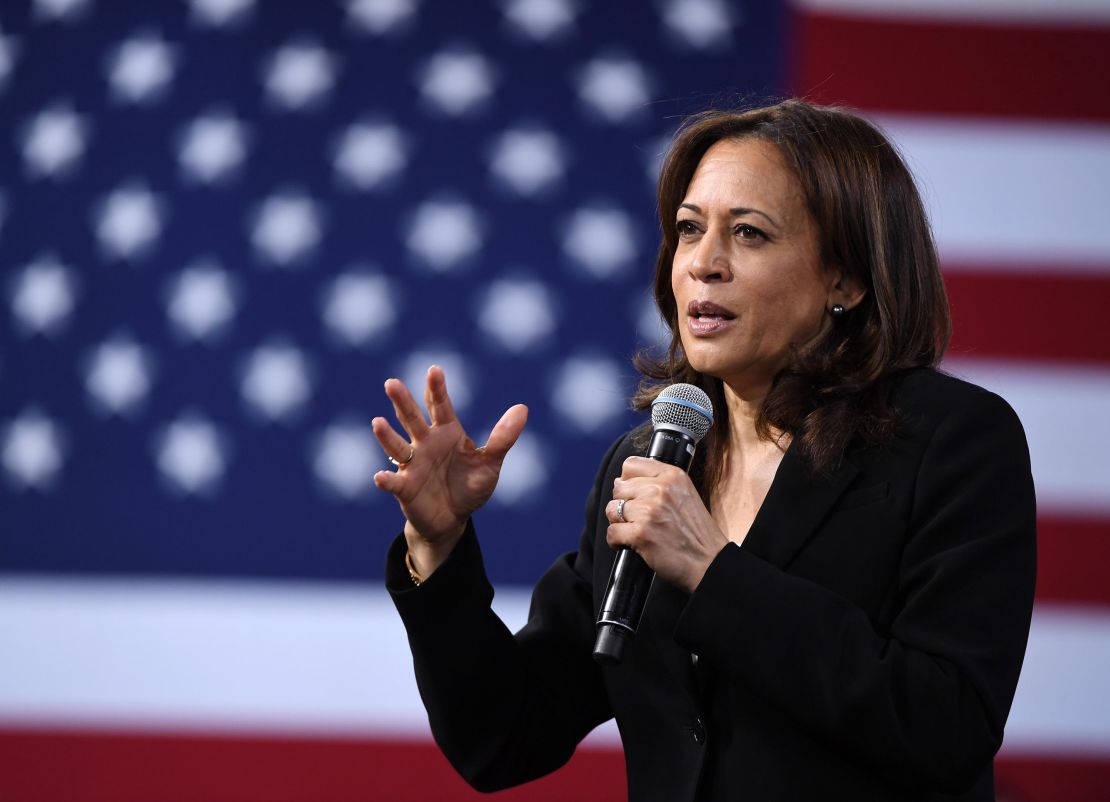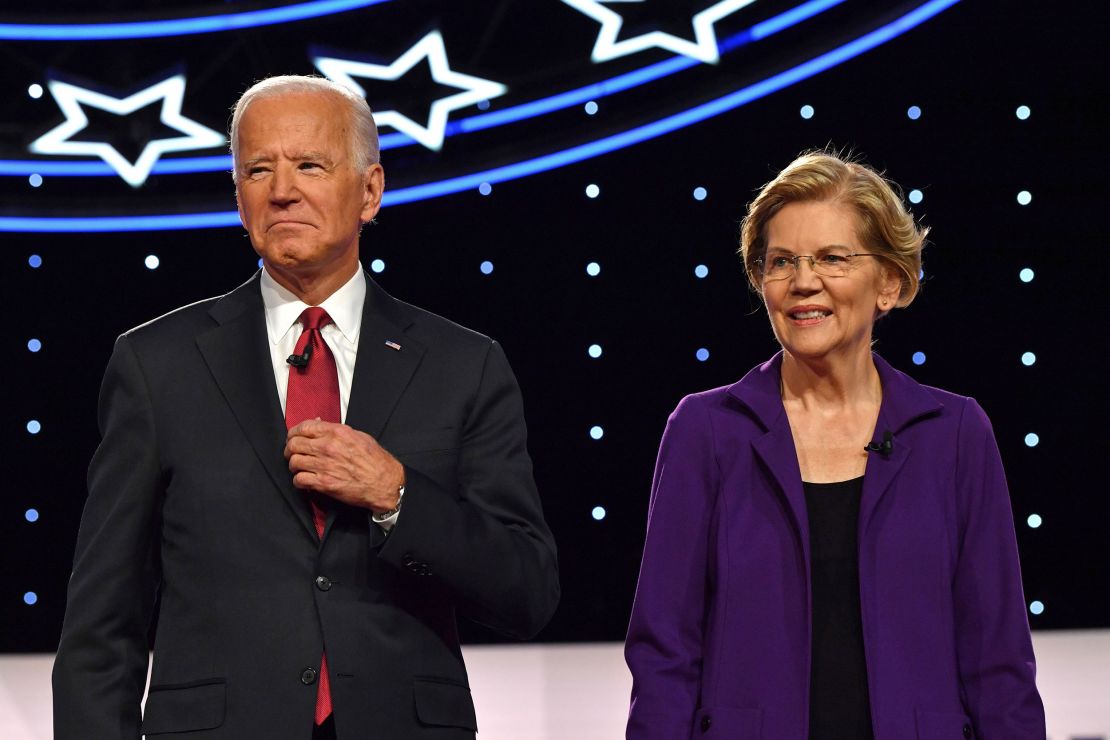Joe Biden is entering the final month of his search for a running mate, a decision people close to the process say is now heavily influenced by a national reckoning on racism, as his search committee pores over records and conducts interviews before presenting a list of finalists to the former vice president.
The search is being conducted under strict secrecy, with most campaign aides, donors and even many longtime Biden friends intentionally kept in the dark. Yet CNN spoke to more than a dozen people close to the Biden search process who believe that four of the leading prospects are Sen. Kamala Harris of California, Sen. Elizabeth Warren of Massachusetts, Rep. Val Demings of Florida and Atlanta Mayor Keisha Lance Bottoms.
“The whole way that (issues of race) have come to fro is having a real, serious impact on the search,” said Rep. Jim Clyburn, a top Democrat in the House with deep ties to the Biden campaign. “You can do a search in order to check a box or you can do a search to get a running mate. I think this search is going to be genuine about getting a running mate rather than checking a box.”
Separate teams of lawyers assigned to each of the contenders are nearing the closing stages of reviewing three distinct types of records – written, financial and medical – in their background checks, according to people involved in the process. Members of the search committee have done extensive interviews with several candidates, the sources tell CNN, but Biden is not likely to sit down with finalists until mid-to-late July, with an announcement expected in early August.
“The colonoscopy of the vetting is now occurring,” a Democratic official involved in the process said, speaking on condition of anonymity to adhere to the privacy surrounding the selection.

The search is a dynamic one, though, which has evolved significantly from when it started, and sources caution that it could change again as the vetting intensifies. The goal is to have an array of options for Biden, particularly if an early favorite runs into complications.
Former Obama administration national security adviser Susan Rice is being thoroughly vetted, two people familiar with the matter say, as well as Rep. Karen Bass of California, who was strongly recommended to Biden by Speaker Nancy Pelosi. Clyburn confirmed to CNN that Bass “is being vetted.”
Sens. Tammy Baldwin of Wisconsin and Tammy Duckworth of Illinois are also among a broader tier under consideration, sources say.
A campaign aide declined to comment on who the Biden campaign is vetting.
The nationwide protests in response to multiple deaths of Black men and women at the hands of police have altered at least some of the thinking around his search for a running mate, people close to Biden’s vetting process tell CNN, leading the committee to prepare for how the former vice president’s pick will respond to this moment of social unrest in America.
“In the past month or so, we have seen a real and meaningful change in public opinion on racial issues and policing in a way that impacts the calculus of this,” said a Democrat familiar with the process, pointing to recent polling about changes in sentiment around everything from systemic racism to support for the Black Lives Matter movement.
The search committee is “making sure their pick lines up with what they think is going to be the most important message this fall,” the source said.
While a considerable share of the vetting has unfolded in plain view, with Biden talking extensively about selecting someone who shares his governing philosophy, teams of lawyers have spent weeks digging into the background of the serious candidates.
The search is officially being led by Los Angeles Mayor Eric Garcetti, former Connecticut Sen. Chris Dodd, Delaware Rep. Lisa Blunt Rochester and former Biden counsel Cynthia Hogan, all of whom have interviewed some of the contenders. Lisa Monaco, a former Homeland Security adviser in the Obama administration, is also playing a key role overseeing the vetting teams.
Visit CNN’s Election Center for full coverage of the 2020 race
From scrutinizing cases that Harris prosecuted in California to examining complaints made against Demings as police chief in Orlando, to combing through the op-eds and scholarly writings of Rice and Warren, the teams of lawyers are still learning about the backgrounds of the potential candidates.
The pandemic has changed at least some aspects of the vetting, with much of the research and conversations done virtually, rather than by lawyers taking trips across the country to dig into each chapter in the lives of prospective running mates. But the objective is the same: Searching for anything embarrassing, distracting or that could otherwise cause a problem for Biden, who has said he will choose someone who is ready to be president from day one.
“Every stone is being turned over, just not necessarily in person,” a person close to the process said.
Since several of the potential contenders are barely known nationally, the Biden campaign is also conducting focus groups, with speeches and videos of the candidates shown to gauge voter reaction. This is typical of recent vice presidential searches, but advisers say the research could carry more importance this year because of the unique dynamics of this search.
The objective of Biden has not changed, several people close to him say, even though the political landscape has been dramatically altered by protests against racism, injustice and police brutality. Three months ago, Biden announced that he would choose a woman as his running mate, but the finalists are now nearly all women of color, with the exception of Warren, sources say.
But the impact of this moment has been felt during the search, most notably in Minnesota Sen. Amy Klobuchar’s decision to bow out of the race after her stock had precipitously fallen after weeks of negative publicity about her interaction with police during her tenure as the top prosecutor in the state’s largest county.
“This is a historic moment, and America must seize on this moment,” Klobuchar said in making the announcement that she was taking herself out of consideration. “And I truly believe as, I actually told the vice president last night when I called him, that I think this is a moment to put a woman of color on that ticket.”
That’s a case that many Democratic leaders have made forcefully – and publicly – and one that Democrats close to the process say is being heard by the search committee. Black voters also played a critical role in Biden’s primary victory, a point that is not lost on his campaign.
“The environment has become so racially charged,” said a Democratic with direct knowledge of the process, “that the pressure to pick a woman of color has gone up significantly.”

And some top Democrats believe that pressure could move up Biden’s timeline on selecting a running mate. The former vice president has said repeatedly that he wants to make the decision around August 1, but some Democrats believe that both the protests roiling the country and the pressure on Biden to pick a Black woman could lead Biden to move up that date.
“As the national momentum in support of a Black woman VP candidate continues to intensify, so does the pressure for Vice President Biden to announce his decision sooner rather than later,” said Karen Finney, who worked as a senior aide to Sen. Tim Kaine when he was Hillary Clinton’s running mate in 2016.
Biden has told several people that his criteria still includes, but is not limited to, someone who has run for office and been tested on the national stage as well as someone he believes can be a strong governing partner. Those traits remain critical, which leads more than a dozen people close to Biden to tell CNN they believe Harris is the leading choice going into the critical final month.
“He needs someone he can trust who is the best governing partner,” a longtime Biden ally tells CNN. “That has not changed.”
It was 12 years ago this summer when Obama chose Biden to join his ticket. The two were not particularly close, but Obama told aides at the time that Biden’s experience and the fact that he was tested on the national stage was essential. Today, that same sentiment informs Biden’s thinking, several people close to him believe.
In this search, people close to both men say, Obama serves as more of a sounding board and counselor to Biden, rather than someone who would try and tip the scales toward one candidate. The two men speak regularly about the political moment facing the country, the sources say, but they have not had an in-depth conversation about finalists being considered by Biden.
Obama was once a strong proponent of Warren, largely because of her big ideas to revive the economy and address income inequality. But people close to him acknowledge it is impossible to separate the vice presidential search with events of the last month in the country.
And while the Biden committee has been working in secret for weeks, two of the most influential people in the selection process – Bob Bauer, Biden’s personal lawyer who is leading the vetting team, and Anita Dunn, a senior Biden campaign official – were part of a report in 2016 for the Bipartisan Policy Center that laid out the best ways to conduct the vice presidential search process.
The report said that while background checks and advice from inside and outside the campaign are all important, “the most important consideration is for the presidential nominee to know or get to know the vice presidential candidates personally.” It recommended the nominee try to spend several days with each of the potential candidates.
But that could prove to be difficult for Biden in the coming weeks. The campaign has drastically reduced in-person events amid the coronavirus pandemic, with fundraisers being held virtually and all events limited in scope to adhere to public health guidelines.
Biden has sought other ways of testing out his political chemistry with the women on his shortlist, including appearing with them in joint video conference events or TV interviews.
Biden allies have consistently said that personal comfort will be a major factor for the former vice president, who openly speaks about his close friendship that developed during eight years serving alongside Obama.
The final decision is also expected to be kept tightly guarded before the announcement from the campaign, a strategy that Bauer and Dunn outlined in the 2016 report, saying: “The notification of selection should be made to the vice presidential nominee in advance of the public announcement, but with notice of only a day or two.”






















